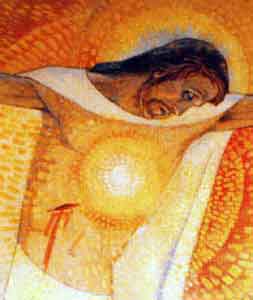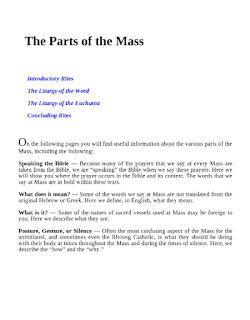Sunday, June 2, 2024
Novena to the Sacred Heart
Corpus Christi - Body and Blood of Christ - June 2
Eucharist means..."thanksgiving"
Michael Dubruiel wrote a book to help people deepen their experience of the Mass. He titled it, How to Get the Most Out of the Eucharist. You can read about it here.
- Serve: Obey the command that Jesus gave to his disciples at the first Eucharist.
- Adore: Put aside anything that seems to rival God in importance.
- Confess: Believe in God’s power to make up for your weaknesses.
- Respond" Answer in gesture, word, and song in unity with the Body of Christ.
- Incline: Listen with your whole being to the Word of God.
- Fast: Bring your appetites and desires to the Eucharist.
- Invite: Open yourself to an encounter with Jesus.
- Commune: Accept the gift of Christ in the Eucharist.
- Evangelize :Take him and share the Lord with others.
Saturday, June 1, 2024
June: Month of the Sacred Heart
The promises of the Sacred Heart of Jesus to Saint Margaret Mary:
1. I will give them all the graces necessary for their state of life.
2. I will give peace in their families.
3. I will console them in all their troubles.
4. I will be their refuge in life and especially in death.
5. I will abundantly bless all their undertakings.
6. Sinners shall find in my Heart the source and infinite ocean of mercy.
7. Tepid souls shall become fervent.
8. Fervent souls shall rise speedily to great perfection.
9. I will bless those places wherein the image of
My Sacred Heart shall be exposed and venerated.
10. I will give to priests the power to touch the most hardened hearts.
11. Persons who propagate this devotion shall
have their names eternally written in my Heart.
12. In the excess of the mercy of my Heart, I promise you that my all powerful love will grant to all those who will receive Communion on the First Fridays, for nine consecutive months, the grace of final repentance: they will not die in my displeasure, nor without receiving the sacraments; and my Heart will be their secure refuge in that last hour.
-Michael Dubruiel
Thursday, May 30, 2024
May 31- Feast of the Visitation
May is Mary's month, a month we pay special attention to the rosary. The Visitation is on of the Joyful Mysteries of the Rosary. Check out this small hardbound book by Michael Dubruiel and Amy Welborn, Praying the Rosary. Click on the cover for more information.

The Gospels show that the gaze of Mary varied depending upon the circumstances of life. So it will be with us. Each time we pick up the holy beads to recite the Rosary, our gaze at the mystery of Christ will differ depending on where we find ourselves at that moment.
Thereafter Mary’s gaze, ever filled with adoration and wonder, would never leave him. At times it would be a questioning look, as in the episode of the finding in the Temple: “Son, why have you treated us so?” (Lk 2:48); it would always be a penetrating gaze, one capable of deeply understanding Jesus, even to the point of perceiving his hidden feelings and anticipating his decisions, as at Cana (cf. Jn 2:5). At other times it would be a look of sorrow, especially beneath the Cross, where her vision would still be that of mother giving birth, for Mary not only shared the passion and death of her Son, she also received the new son given to her in the beloved disciple (cf. Jn 19:26-27). On the morning of Easter hers would be a gaze radiant with the joy of the Resurrection, and finally, on the day of Pentecost, a gaze afire with the outpouring of the Spirit (cf. Acts 1:14) [Rosarium Virginis Mariae, no. 10].
As we pray the Rosary, then, we join with Mary in contemplating Christ. With her, we remember Christ, we proclaim Him, we learn from Him, and, most importantly, as we raise our voices in prayer and our hearts in contemplation of the holy mysteries, this “compendium of the Gospel” itself, we are conformed to Him.
Wednesday, May 29, 2024
Michael Dubruiel
Since the time of early Christianity, there have been forms
of prayer that use breathing as a cadence for prayer. The Jesus
Prayer and the Rosary, along with various forms of contemplative
prayer, are all variations of this type of prayer. The real prayer
behind all of these methods is the prayer of surrender: “Into
your hands I commend my spirit.” This was the prayer that Jesus
prayed to the Father from the cross.
Though confession alone does not remove the temporal penalty
of sin, healing still is possible by God’s grace. Prayer, reading the
Scripture, giving alms, doing good works all are acts that have
had indulgences attached to them by the Church. By obtaining
an indulgence, the Christian receives healing from the temporal
penalty of even the gravest sins, reducing or eliminating altogether
the time of purification needed in purgatory (CCC 1471).
Ideally, the Christian is motivated to perform these spiritual
exercises not from fear of punishment but out of love for God.
As we read in the preceding passage, St. Paul tells the Ephesians
to offer themselves as a spiritual sacrifice with Christ, who has
paid the debt of our sins. Seeing Christ on the cross and meditating
on his love for us should help us to understand how much
God loves
Tuesday, May 28, 2024
Jesus of Nazareth by Pope Benedict XVI
by Michael Dubruiel...from 2007
I think with the release of this book (which I got yesterday and read straight through) the pope is positioning himself to be the St. Thomas Aquinas of our age. How or why do I say this? Because like St. Thomas who answered the objections to the Faith in his day, this pope is doing the same.
A few months ago someone asked me what book I would recommend that they give to their adult children who no longer practiced the faith, without hesitation I named this book as the one. At the time I had only read some excerpts available online from Germany and Italy. It was an act of faith then, now that I have the book I know that my recommendation was justified.
This is a great book, magisterial (even though the pope doesn't want it thought of in that way). It is not just another book about Jesus, it a revolutionary book about Jesus...in that it recaptures why people have had their lives changed by their belief in Jesus for over 2,000 years.
What makes this book so special? It is like a modern Summa (those who know St. Thomas Aquinas will understand me here) in that it answers modern questions of doubt, skepticism and even inquiry on not only who Jesus is, but why Jesus is the most important person anyone has ever or can ever know.
The pope's methodology is to take a scene from the Bible, like the Lord's baptism and then to draw on that scene from the entire Bible, to show what modern scholarship has done to help us to understand the historical context of the scene, tell us how the early Church fathers interpreted the scene, how would it have been viewed in Judaism (he uses the reflections of a Rabbi when discussing the Sermon on the Mount) and then to give the reader the meaning of this event for them. Along the way he answers questions to the many objections modern people bring to their encounter with Jesus.
As someone who has studied theology for a number of years and been exposed to every screwball theology out there, I found this book to be a corrective lens to refocus and correct my vision of who Jesus is and what following him means. What impresses me (and I'm not easily impressed) is that the Pope takes on the "screwball (my term, not his)" theologies in such a way as to making them seem silly (although he is incredibly charitable in his approach).
This book will have a great effect on renewing the Church and centering it on an image of Christ that is Biblical and credible, erasing years of poor and faulty preaching and teaching.
If you are not Catholic, but a Christian you will love this book too. In fact I predict you will be come a big fan of Joseph Ratzinger and will want to read his many published works to encounter someone rooted in Scripture and conversant with modern attacks on it. If you are a non Christian I think you will find in the book an excellent introduction to what Christians believe about the God-man from Nazareth. To all you parents out there who sent your kids to Catholic schools and now wish they would practice their faith, give them this book and reintroduce them to Jesus of Nazareth.
Monday, May 27, 2024
Michael Dubruiel: Pocket Guide to the Mass
Michael Dubruiel's Pocket Guide to the Mass - a sample page.
Walks you through the Mass, explaining the biblical basis of prayers, the meaning behind gestures, and a brief overview of the spirituality that brings Catholics together for Eucharist each week.
Published in 2007, still in print.
An excellent resource for your parish for the Eucharistic Revival year.
More books by Michael Dubruiel





